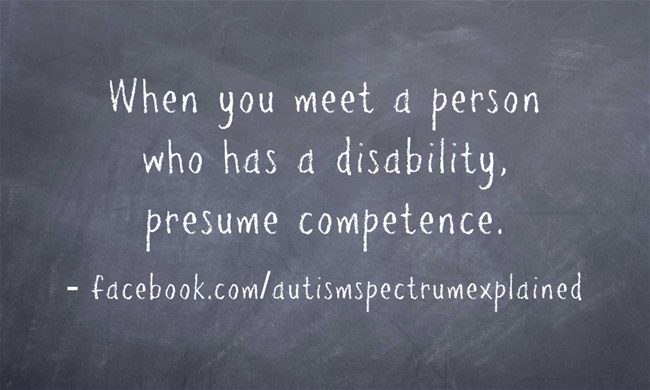And she flinches, as though I’d just mortally insulted her. And in Caley’s world, the world of people with autism, I have. Because words are weapons, and even the sweetest sounding ones can cut, can be used to demean and diminish those they target. Cute is one of the words that you’d never think of as offensive, but Caley would rather I used any other four letter word around her…any one but that one.
Let me show you what I mean. Before Caley came to college, I let her stay in my dorm room for a while to dip her toes into the college experience. While she was staying with me, an acquaintance came by and spotted Caley. People can generally tell that something's ‘different’ about Caley, and often guess it has something to do with a disability, although they can't quite put their finger on what that disability is. This acquaintance was apparently one of these people and when she determined Caley was ‘different’ she adapted her own demeanor towards Caley accordingly.
When she finally left the room, I was left with a very odd sensation. Something felt very wrong and weird about the interaction I'd just seen, but I couldn't quite label what it was. After a lifetime of defending Caley from peers who meant her harm, verbally or otherwise, I’d gotten pretty good at determining subtle undertones of anger, taunting, and verbal barbs. But try as I might, I couldn’t find a single instance of any of those in her visit. In fact, my acquaintance had been very nice – even saccharinely so – to Caley. Why, then, was I left with a bad taste in my mouth? Finally, I figured it out.
My acquaintance had treated Caley like she was a small child. As soon as she’d gathered enough data to dump Caley into her mental ‘disabled’ category, my acquaintance had immediately switched to baby speech. She’d spoken very slowly, exaggerating every word, dumbed down her vocabulary, and reacted with over-acted enthusiasm to every phrase that came out of Caley's mouth. At one point, she literally patted Caley on the head. And, what's more, every few sentences or so, my acquaintance would look up at me with a bright smile and utter that damning phrase, "Your sister's so cute!"
Despite knowing that Caley was going to be coming to the Honors college next year, and therefore quite smart, upon sensing that vague feeling of disability she'd immediately down-graded her view of Caley's intelligence and maturity all the way down to that of a 5 year old. And in this instance, as in many, this ableist-fueled demotion was encapsulated by one word: “cute.”
This is but one example of a deluge of such well-intended but nonetheless offensive occurrences that Caley has dealt with her entire life. Classmates, teachers, relatives, random passers-by in the grocery store, one of the first things they exclaim when they meet her is “You’re so cute!” (or worse, they’ll judge her as not competent enough to interact with them and turn to our mother or myself instead and tell us how cute Caley is).
Cute is a dirty word in our family. But it doesn’t have to be. You see, the only things that make that word as negative as it is the fact that it reflects a broader societal narrative. And that narrative is that people who are disabled, whether due to autism or otherwise, are inherently not competent. If you change the narrative, you change the connotation of the word and all of a sudden I can tell my sister that she really does look cute in that frog beanie without making an implication about her competence.
I guess what I’m saying is, when we meet someone with a disability, we all need to presume competence. I’m not saying we shouldn’t give accommodations when they’re needed. We should. But when it comes to interacting with people with disabilities, we should judge based on the person in front of us instead of based on stereotypes, talk to the person instead of about them, and address them with the respect that someone their age – or even better, any human being – deserves.
Caley’s got a sticker stuck to the door of her bedroom which reads, “When you see, meet, or think about a person with a disability, PRESUME COMPETENCE.” She told me that she put it there as a reminder to herself that she is a competent human being, despite the narrative that tells her otherwise, but let it be a reminder to all of us now.
When you meet someone with a disability, presume competence.
#presumecompetence #differentnotless

 RSS Feed
RSS Feed
